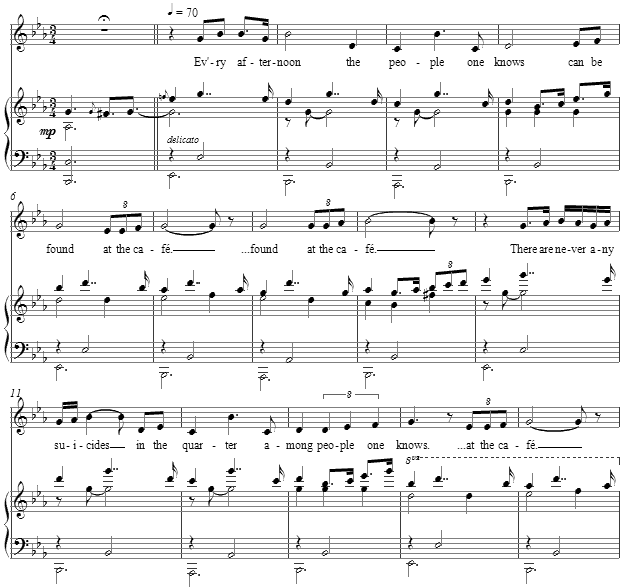Music and Texts of GARY BACHLUND
Vocal Music | Piano | Organ | Chamber Music | Orchestral | Articles and Commentary | Poems and Stories | Miscellany | FAQs
Montparnasse (1920) - (2007)
Ernest Hemingway
for medium voice and piano
There are never any suicides in the quarter among people one knows
No successful suicides.
A Chinese boy kills himself and is dead.
(they continue to place his mail in the letter rack at the Dome)
A Norwegian boy kills himself and is dead.
(no one knows where the other Norwegian boy has gone)
They find a model dead
alone in bed and very dead.
(it made almost unbearable trouble for the concierge)
Sweet oil, the white of eggs, mustard and water, soap suds
and stomach pumps rescue the people one knows.
Every afternoon the people one knows can be found at the café.[ 5 pages, circa 4' 20" ]
Ernest Hemingway (1899-1961)
One of the most famous American novelist, short-story writer and essayist, whose deceptively simple prose style have influenced wide range of writers. Hemingway was awarded the 1954 Nobel Prize for Literature. He was unable to attend the award ceremony in Stockholm, because he was recuperating from injuries sustained in an airplane crash while hunting in Uganda. The photo above captures his more publicly known persona late in his life, but the photo below captures the poet who wrote the text above.
Born in Oak Park, Illinois, and after his graduation in 1917, Hemingway worked six months as a reporter for The Kansas City Star. He then joined a volunteer ambulance unit in Italy during World War I. In 1918 he suffered a severe leg wound. For his service, Hemingway was twice decorated by the Italian government. The photograph below is of Hemingway, taken in Milan in 1918 while serving in the ambulance corps.
Hemingway's affair with an American nurse, Agnes von Kurowsky, during his hospital recuperation gave basis for the novel A Farewell to Arms (1929), which is a tragic love story. After the war Hemingway worked for a short time as a journalist in Chicago. He moved in 1921 to Paris, where wrote articles for the Toronto Star. Hemingway wrote, "If you are lucky enough to have lived in Paris as a young man, then whenever you go for the rest of your life, it stays with you, for Paris is a moveable feast." (from A Moveable Feast, 1964) A part of that moveable feast must surely then have been the tragic tales to which Hemingway the poet alludes in the above text. Of American literature, he wrote, ""All modern American literature comes from one book by Mark Twain called Huckleberry Finn." More accurately, now American literature is colored by such works as Hemmingway's own Death in the Afternoon (1932), To Whom the Bell Tolls (1940), and a whole opera onmia through to his wondrous The Old Man and the Sea (1952).
In Europe, the center of modernist movement, Hemingway associated with such writers as Gertrude Stein and F. Scott Fitzgerald, who edited some of his texts and acted as his agent. This text was first published in Three Stories & Ten Poems (Dijon: Maurice Darantiere, 1923), this and other poems of the period capture Hemmingway's seemingly off-hand and casual reporting of grim events.
The area known as Montparnasse, on the left bank of Paris, attracted many artists and writers from overseas in the 1920s, and the Dome to which Hemmingway refers was a café in the quarter. The mundane list of methods for overcoming overdoses is remarkable; it is common and seemingly part of the usual landscape for those who would frequent this world, as common as are the deaths of those whose suicides go unnoticed.
The un-rhymed style presented an opportunity to break apart the order of the sentences, as I begin the setting with the last line, so as to emphasize the commonplace in this common place café. The simple four-measure ground bass and harmonic formula repeat, though the elements shift to camouflage the repetitiveness of the form. The song should be sung with a lethargic feeling, while yet being playful, and the accompaniment remain unchanging in its continuous background movement.

Another setting of Hemingway's poems is I Like Americans.

